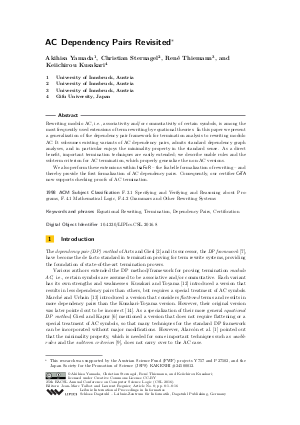AC Dependency Pairs Revisited
Authors Akihisa Yamada, Christian Sternagel, René Thiemann, Keiichirou Kusakari
-
Part of:
Volume:
25th EACSL Annual Conference on Computer Science Logic (CSL 2016)
Part of: Series: Leibniz International Proceedings in Informatics (LIPIcs)
Part of: Conference: Computer Science Logic (CSL) - License:
 Creative Commons Attribution 3.0 Unported license
Creative Commons Attribution 3.0 Unported license
- Publication Date: 2016-08-29
File

PDF
LIPIcs.CSL.2016.8.pdf
- Filesize: 0.49 MB
- 16 pages
Document Identifiers
Subject Classification
Keywords
- Equational Rewriting
- Termination
- Dependency Pairs
- Certification
Metrics
- Access Statistics
-
Total Accesses (updated on a weekly basis)
0Document
0Metadata
Abstract
Rewriting modulo AC, i.e., associativity and/or commutativity of certain symbols, is among the most frequently used extensions of term rewriting by equational theories. In this paper we present a generalization of the dependency pair framework for termination analysis to rewriting modulo AC. It subsumes existing variants of AC dependency pairs, admits standard dependency graph analyses, and in particular enjoys the minimality property in the standard sense. As a direct benefit, important termination techniques are easily extended; we describe usable rules and the subterm criterion for AC termination, which properly generalize the non-AC versions. We also perform these extensions within IsaFoR - the Isabelle formalization of rewriting - and thereby provide the first formalization of AC dependency pairs. Consequently, our certifier CeTA now supports checking proofs of AC termination.
Cite As Get BibTex
Akihisa Yamada, Christian Sternagel, René Thiemann, and Keiichirou Kusakari. AC Dependency Pairs Revisited. In 25th EACSL Annual Conference on Computer Science Logic (CSL 2016). Leibniz International Proceedings in Informatics (LIPIcs), Volume 62, pp. 8:1-8:16, Schloss Dagstuhl – Leibniz-Zentrum für Informatik (2016)
https://doi.org/10.4230/LIPIcs.CSL.2016.8
BibTex
@InProceedings{yamada_et_al:LIPIcs.CSL.2016.8,
author = {Yamada, Akihisa and Sternagel, Christian and Thiemann, Ren\'{e} and Kusakari, Keiichirou},
title = {{AC Dependency Pairs Revisited}},
booktitle = {25th EACSL Annual Conference on Computer Science Logic (CSL 2016)},
pages = {8:1--8:16},
series = {Leibniz International Proceedings in Informatics (LIPIcs)},
ISBN = {978-3-95977-022-4},
ISSN = {1868-8969},
year = {2016},
volume = {62},
editor = {Talbot, Jean-Marc and Regnier, Laurent},
publisher = {Schloss Dagstuhl -- Leibniz-Zentrum f{\"u}r Informatik},
address = {Dagstuhl, Germany},
URL = {https://drops.dagstuhl.de/entities/document/10.4230/LIPIcs.CSL.2016.8},
URN = {urn:nbn:de:0030-drops-65488},
doi = {10.4230/LIPIcs.CSL.2016.8},
annote = {Keywords: Equational Rewriting, Termination, Dependency Pairs, Certification}
}
Author Details
References
-
B. Alarcón, S. Lucas, and J. Meseguer. A dependency pair framework for A∨C-termination. In WRLA 2010, volume 6381 of LNCS, pages 36-52, 2010.

-
T. Arts and J. Giesl. Termination of term rewriting using dependency pairs. Theor. Compt. Sci. , 236(1-2):133-178, 2000.

-
F. Baader and T. Nipkow. Term Rewriting and All That. Cambridge University Press, 1998.

-
N. Dershowitz and Z. Manna. Proving termination with multiset orderings. Communications of the ACM, 22(8):465-476, 1979.

-
J. Giesl, M. Brockschmidt, F. Emmes, F. Frohn, C. Fuhs, C. Otto, M. Plucker, P. Schneider-Kamp, T. Stroder, S. Swiderski, and R. Thiemann. Proving termination of programs automatically with AProVE. In IJCAR 2014, LNAI 8562, pages 184-191, 2014.

-
J. Giesl and D. Kapur. Dependency pairs for equational rewriting. In RTA 2001, volume 2051 of LNCS, pages 93-107, 2001.

-
J. Giesl, R. Thiemann, and P. Schneider-Kamp. The dependency pair framework: Combining techniques for automated termination proofs. In LPAR 2004, volume 3452 of LNAI, pages 75-90, 2004.

-
N. Hirokawa and A. Middeldorp. Automating the dependency pair method. Inf. Comput. , 199(1,2):172-199, 2005.

-
N. Hirokawa and A. Middeldorp. Tyrolean Termination Tool: Techniques and features. Inf. Comput. , 205(4):474-511, 2007.

-
J.-P. Jouannaud and H. Kirchner. Completion of a set of rules modulo a set of equations. SIAM Journal on Computing, 15(4):1155-1194, 1986.

-
K. Kusakari and M. Sakai. Enhancing dependency pair method using strong computability in simply-typed term rewriting. Appl. Algebr. Eng. Comm. Compt. , 18(5):407-431, 2007.

-
K. Kusakari and Y. Toyama. On proving AC-termination by AC-dependency pairs. IEICE T. Inf. Syst. , E84-D(5):439-447, 2001.

-
C. Marché and X. Urbain. Termination of associative-commutative rewriting by dependency pairs. In RTA 1998, volume 1379 of LNCS, pages 241-255, 1998.

-
C. Marché and X. Urbain. Modular and incremental proofs of AC-termination. J. Symb. Comput. , 38(1):873-897, 2004.

-
T. Nipkow, L.C. Paulson, and M. Wenzel. Isabelle/HOL - A Proof Assistant for Higher-Order Logic, volume 2283 of LNCS. Springer, 2002.

-
G. Peterson and M. Stickel. Complete sets of reductions for some equational theories. J. ACM, 28(2):233-264, 1981.

-
A. Rubio. A fully syntactic AC-RPO. Inf. Comput. , 178(2):515-533, 2002.

-
C. Sternagel and R. Thiemann. Certified subterm criterion and certified usable rules. In RTA 2010, volume 6 of LIPIcs, pages 325-340, 2010.

-
C. Sternagel and R. Thiemann. A relative dependency pair framework. In WST 2012, pages 79-83, 2012.

-
Christian Sternagel and Rene Thiemann. The certification problem format. In UITP 2014, volume 167 of EPTCS, pages 61-72, 2014.

-
TeReSe. Term Rewriting Systems, volume 55 of Cambridge Tracts in Theoretical Computer Science. Cambridge University Press, 2003.

-
R. Thiemann, G. Allais, and J. Nagele. On the formalization of termination techniques based on multiset orderings. In RTA 2012, volume 15 of LIPIcs, pages 339-354, 2012.

-
R. Thiemann and C. Sternagel. Certification of termination proofs using CeTA. In TPHOLs 2009, volume 5674 of LNCS, pages 452-468, 2009.

-
A. Yamada, K. Kusakari, and T. Sakabe. Nagoya Termination Tool. In RTA-TLCA 2014, volume 8560 of LNCS, pages 466-475, 2014.

-
A. Yamada, S. Winkler, N. Hirokawa, and A. Middeldorp. AC-KBO revisited. Theor. Pract. Log. Prog. , 16(2):163-188, 2014.

